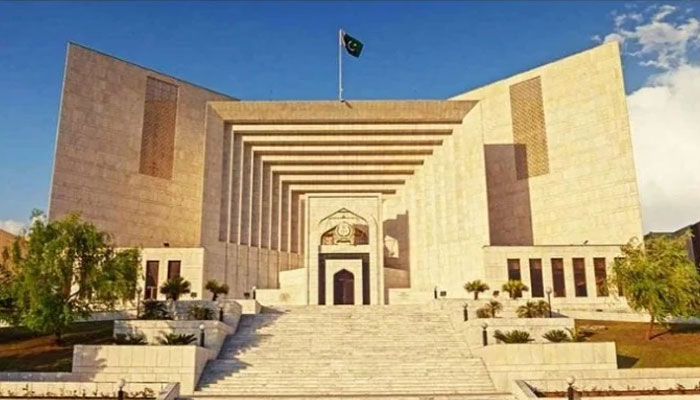Long march: Supreme Court returns PTI petition
Asad Umer filed a petition in the court praying for not creating any hindrance or obstacle whatsoever, including blocking access to or from any place or city in any manner by putting up containers, etc. or from restricting the movement of the people in any manner
ISLAMABAD: The Supreme Court of Pakistan on Thursday returned the petition of Pakistan Tehreek-e-Insaf (PTI) seeking its direction for restraining the federal as well as provincial governments from torture or arrest or use of any force or coercive measures against the citizens of Pakistan and the supporters, workers, members and leaders of the public who want to peacefully hold any protest or assembly announced by it.
The PTI General Secretary, Asad Umer, the other day had filed a petition in the Supreme Court praying for not creating any hindrance or obstacle whatsoever, including blocking access to or from any place or city in any manner by putting up containers, etc. or from restricting the movement of the people in any manner.
The Registrar's office of the Supreme Court, however, returned the petition by raising objections that almost a similar issue has been already decided by the apex court in the petition filed by the Islamabad High Court Bar Association.
The Registrar's office also stated that the petitioner has not approached any other appropriate forum available under the law for the same relief and has also not provided any justification for not doing so.
Similarly, the office also stated that instant petition contains scandalous matter in paragraphs number 4, 5,12, and 14, hence attracts Order XVII Rule 5 of the Supreme Court Rules 1980.
It is pertinent to mention here that in its petition, the PTI General Secretary, Asad Umer, had submitted before the court that its chief Imran Khan was removed from office through a murky and illegally-orchestrated vote of no confidence. He had further stated in the petition that in order to galvanise the people of Pakistan against this 'illegally-orchestrated regime change', the petitioner has been holding several rallies and gatherings all across the country.
The party general secretary had further submitted in the petition that Imran Ahmed Khan Niazi was illegally ousted from the Prime Minister’s office through an orchestrated vote of no confidence in Majlis-e-Shoora on April 10. The people of Pakistan, in hundreds of thousands, came out (unplanned) into the street to register their protest against the illegal removal of the petitioner from the government.
The PTI had questioned as to whether freedom of movement, and the right to peaceful protest and procession, is a fundamental right of all the citizens of Pakistan, under the Constitution and whether constitutional rights, enshrined in articles 4, 5, 8, 9, 10, 14, 15, 16, 17, 19 and 25 of the Constitution, can be unreasonably curtailed by executive authorities, through use of disproportionate and unlawful force on peaceful citizenry?
"Whether the fundamental rights, enshrined in articles 8, 9, 10, 14, 15, 16, 17, 19 and 25 of the Constitution must be respected and protected from unconstitutional and illegal curtailment by the governmental authorities," the PTI questioned and further asked as to whether the State and governmental agencies of Pakistan can unlawfully deprive citizens of their liberty, guaranteed under Article 9 and 10 of the Constitution, by arresting individuals who are participating in, or intend to participate in a peaceful protest for the attainment of their democratic rights?
-
 Andy Cohen Gets Emotional As He Addresses Mary Cosby's Devastating Personal Loss
Andy Cohen Gets Emotional As He Addresses Mary Cosby's Devastating Personal Loss -
 Andrew Feeling 'betrayed' By King Charles, Delivers Stark Warning
Andrew Feeling 'betrayed' By King Charles, Delivers Stark Warning -
 Andrew Mountbatten's Accuser Comes Up As Hillary Clinton Asked About Daughter's Wedding
Andrew Mountbatten's Accuser Comes Up As Hillary Clinton Asked About Daughter's Wedding -
 US Military Accidentally Shoots Down Border Protection Drone With High-energy Laser Near Mexico Border
US Military Accidentally Shoots Down Border Protection Drone With High-energy Laser Near Mexico Border -
 'Bridgerton' Season 4 Lead Yerin Ha Details Painful Skin Condition From Filming Steamy Scene
'Bridgerton' Season 4 Lead Yerin Ha Details Painful Skin Condition From Filming Steamy Scene -
 Matt Zukowski Reveals What He's Looking For In Life Partner After Divorce
Matt Zukowski Reveals What He's Looking For In Life Partner After Divorce -
 Savannah Guthrie All Set To Make 'bravest Move Of All'
Savannah Guthrie All Set To Make 'bravest Move Of All' -
 Meghan Markle, Prince Harry Share Details Of Their Meeting With Royals
Meghan Markle, Prince Harry Share Details Of Their Meeting With Royals -
 Hillary Clinton's Photo With Jeffrey Epstein, Jay-Z And Diddy Fact-checked
Hillary Clinton's Photo With Jeffrey Epstein, Jay-Z And Diddy Fact-checked -
 Netflix, Paramount Shares Surge Following Resolution Of Warner Bros Bidding War
Netflix, Paramount Shares Surge Following Resolution Of Warner Bros Bidding War -
 Bling Empire's Most Beloved Couple Parts Ways Months After Announcing Engagement
Bling Empire's Most Beloved Couple Parts Ways Months After Announcing Engagement -
 China-Canada Trade Breakthrough: Beijing Eases Agriculture Tariffs After Mark Carney Visit
China-Canada Trade Breakthrough: Beijing Eases Agriculture Tariffs After Mark Carney Visit -
 Police Arrest A Man Outside Nancy Guthrie’s Residence As New Terrifying Video Emerges
Police Arrest A Man Outside Nancy Guthrie’s Residence As New Terrifying Video Emerges -
 London To Host OpenAI’s Biggest International AI Research Hub
London To Host OpenAI’s Biggest International AI Research Hub -
 Elon Musk Slams Anthropic As ‘hater Of Western Civilization’ Over Pentagon AI Military Snub
Elon Musk Slams Anthropic As ‘hater Of Western Civilization’ Over Pentagon AI Military Snub -
 Walmart Chief Warns US Risks Falling Behind China In AI Training
Walmart Chief Warns US Risks Falling Behind China In AI Training




